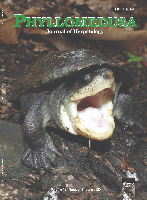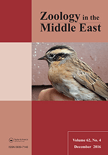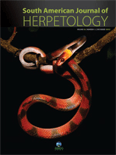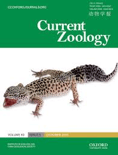
PHYLLOMEDUSA
Scope & Guideline
Championing conservation through accessible scholarly articles.
Introduction
Aims and Scopes
- Herpetological Research:
The journal primarily publishes research on amphibians and reptiles, covering aspects such as morphology, behavior, ecology, and conservation. This focus is evident in numerous studies that explore various species across different geographical regions. - Conservation Biology:
A significant portion of the publications addresses conservation-related topics, including the ecology of endangered species, habitat assessments, and the implications of genetic studies for conservation strategies. - Ecological Interactions:
The journal emphasizes studies that investigate ecological relationships, such as predation, competition, and mutualism among herpetofauna, which are crucial for understanding ecosystem dynamics. - Morphological and Behavioral Studies:
Research exploring morphological traits and behavioral adaptations of amphibians and reptiles is a consistent theme, providing insights into their evolution and survival strategies. - Field Studies and Biodiversity Assessments:
Many papers focus on field studies that document species distribution, habitat preferences, and community composition, contributing to biodiversity knowledge and conservation planning.
Trending and Emerging
- Genomic and Genetic Studies:
There is an increasing focus on genomic research and the implications of genetic diversity for conservation, as seen in studies of mitogenomes and population genetics. - Impact of Climate Change:
Recent studies are beginning to address the effects of climate change on amphibian and reptile populations, highlighting the need for research that informs adaptive management strategies. - Behavioral Ecology and Plasticity:
Research on behavioral responses to environmental changes and the plasticity of traits in response to ecological pressures is gaining traction, reflecting a broader interest in adaptive strategies. - Conservation and Management Practices:
Emerging themes include practical approaches to conservation, with studies evaluating the effectiveness of management practices for endangered species and their habitats. - Urban Ecology and Human Impact:
There is a growing body of work focusing on the interactions between herpetofauna and urban environments, exploring how human activities influence species behavior and distribution.
Declining or Waning
- Traditional Taxonomy:
There has been a noticeable decrease in papers focused solely on traditional taxonomic descriptions, as the field shifts towards integrative approaches that combine molecular data with morphological assessments. - Generalized Habitat Studies:
Studies that provide only broad habitat descriptions without specific ecological or behavioral insights appear to be waning, as researchers now favor detailed ecological assessments that inform conservation efforts. - Species-Specific Studies without Conservation Context:
Papers that focus exclusively on individual species without emphasizing their conservation status or ecological roles in their environments are becoming less common. - Overly Broad Ecological Studies:
There seems to be a decline in studies that cover overly broad ecological aspects without a specific focus on herpetofauna, as the trend moves towards more targeted and species-specific research.
Similar Journals

ZOOLOGY IN THE MIDDLE EAST
Connecting Science and Conservation in the Middle EastZoology in the Middle East, published by Taylor & Francis Ltd, is a pivotal journal dedicated to advancing the field of zoological research with a distinct focus on the rich and diverse fauna of the Middle Eastern region. With its ISSN of 0939-7140 and an E-ISSN of 2326-2680, this journal has successfully carved out a niche for itself since its inception in 1986, covering topics of significant relevance to animal science and zoology, as evidenced by its Q2 ranking in the 2023 category quartiles. Although it operates as a subscription-based journal, it aims to disseminate high-quality research articles, reviews, and case studies that contribute to the understanding of animal biodiversity and conservation in the Middle East. With a Scopus ranking placing it in the 38th percentile of the agricultural and biological sciences category, Zoology in the Middle East serves as an essential resource for researchers, professionals, and students who seek to deepen their knowledge and appreciation of the region's zoological heritage. Scholarly contributions to this journal not only enhance scientific discourse but also inform conservation strategies and policy-making in an area that is critical to global biodiversity.

South American Journal of Herpetology
Innovating studies in the heart of South American biodiversity.South American Journal of Herpetology is a vital resource in the field of herpetology, published by the Sociedade Brasileira de Herpetologia. Established to advance the study of amphibians and reptiles, this journal aims to bridge the gap between regional science and global research. As an influential platform operating from Brazil, it serves as a forum for researchers, professionals, and students dedicated to understanding the rich diversity of South American herpetofauna. With a focus on innovative studies and critical reviews, the journal has been categorized in the Q3 quartile for both Animal Science and Zoology and Ecology, Evolution, Behavior and Systematics as of 2023, indicating a growing impact within these disciplines. Although currently not open access, it offers unique insights into the ecological and evolutionary aspects of herpetology, contributing significantly to discussions on conservation and biodiversity. The journal is housed at the prestigious Museu de Zoologia da Universidade de São Paulo, ensuring high academic standards and engagement with leading researchers in the field.

Zoological Letters
Exploring contemporary issues in zoology with clarity.Zoological Letters, published by BMC, is a premier open-access journal dedicated to advancing the field of zoology and animal science. Since its inception in 2015, the journal has established itself as a critical platform for researchers to disseminate their findings and contribute to the ongoing discourse in this vibrant discipline. Based in the United Kingdom, Zoological Letters boasts an impressive Q2 category ranking in Animal Science and Zoology for 2023, placing it within the top 25% of journals in the field. With a Scopus rank of #116 out of 490, representing the 76th percentile, it showcases the influence and reach of the research published within its pages. The journal’s substantial focus on contemporary issues and methodologies ensures that it is a vital resource for academics, professionals, and students alike, fostering innovation and collaboration throughout the global scientific community. Open access since 2015, Zoological Letters is committed to making scientific knowledge accessible, thus enhancing the visibility and impact of research in zoological studies.

ZOOLOGICHESKY ZHURNAL
Unveiling the mysteries of behavior and systematics in the animal kingdom.Zoologichesky Zhurnal, a prominent journal in the field of Ecology, Evolution, Behavior and Systematics, has been a vital publication since its inception in 1950. Published by MAIK Nauka-Interperiodica in the Russian Federation, this journal has established a notable reputation in disseminating scientific research and advancing knowledge in zoology. With its coverage spanning from 1950 to 2023, and a specific convergent focus during 1982-1983, this journal contributes significantly to the ecological and evolutionary sciences, even though it currently holds a Q4 classification in the 2023 category quartiles, indicating its niche positioning among peers. Researchers and students engaged in the study of biological sciences, particularly those interested in the dynamics of ecosystems, behavior of species, and evolutionary processes, will find valuable insights and original research articles within its pages. While access to this esteemed journal is not open, it remains an essential resource for those seeking to deepen their understanding of zoological sciences.

RUSSIAN JOURNAL OF HERPETOLOGY
Championing High-Quality Research in HerpetologyRUSSIAN JOURNAL OF HERPETOLOGY is a prominent scholarly publication dedicated to the field of herpetology, focusing on the study of reptiles and amphibians. Published by FOLIUM PUBL CO in the Russian Federation, this journal aims to foster the exchange of knowledge and research in animal science, ecology, evolution, and behavior. With its ISSN 1026-2296 and a significant commitment to high-quality academic discourse, the journal maintains a respectable standing within the Q3 quartile in both Animal Science and Zoology, as well as in Ecology, Evolution, Behavior, and Systematics. This attributes to its Scopus rank among leading journals in related fields, enhancing its visibility and influence. Spanning from 2014 through 2024, it publishes rigorous research that explores the diversity, biology, and conservation of herpetofauna, making it a vital resource for researchers, professionals, and students alike who are invested in the ecological and evolutionary dynamics of these species.

Journal of Vertebrate Biology
Innovating research in animal science and ecology.Journal of Vertebrate Biology, a reputable publication established by the Institute of Vertebrate Biology in the Czech Republic, serves as a vital platform for research across the fields of Animal Science and Zoology, Aquatic Science, and Ecology, Evolution, Behavior and Systematics. With its ISSN 2694-7684 and a commendable 2023 Q2 ranking in multiple categories, this open-access journal embraces innovative scientific inquiry and fosters academic discourse. The journal's commitment to disseminating high-quality research is reflected in its Scopus rankings, positioning it within the top quartile in several impactful areas. As it continues to converge its focus until 2024, researchers, professionals, and students alike are encouraged to engage with cutting-edge studies that advance our understanding of vertebrate biology. This publication stands out not only in its scholarly contributions but also in enhancing global awareness of biodiversity and conservation issues.

AMPHIBIAN & REPTILE CONSERVATION
Exploring Solutions for Amphibian and Reptile SurvivalAMPHIBIAN & REPTILE CONSERVATION, published by the Amphibian Conservation Research Center & Lab, is a leading journal dedicated to the field of herpetology and environmental conservation. With an ISSN of 1083-446X and an E-ISSN of 1525-9153, this journal serves as a vital resource for researchers, conservationists, and students interested in the preservation of amphibian and reptile species. The journal has achieved remarkable rankings, categorized in the Q2 quartile for Animal Science and Zoology, Ecology, and Nature and Landscape Conservation as of 2023, reflecting its significant contribution to the scientific community. Over the converged years from 2016 to 2024, the journal has established itself as an integral platform for disseminating research findings, fostering collaboration, and enhancing the understanding of biodiversity and ecosystem dynamics. By embracing an open-access approach, AMPHIBIAN & REPTILE CONSERVATION ensures that critical research is readily available to a global audience, promoting informed conservation efforts and policy advocacy to safeguard these vital species amidst their declining populations.

ANIMAL BIOLOGY
Pioneering Studies in the Dynamic World of Animal BiologyANIMAL BIOLOGY is a distinguished journal published by BRILL, focusing on the dynamic fields of Animal Science and Zoology, as well as Ecology, Evolution, Behavior, and Systematics. With an ISSN of 1570-7555 and an E-ISSN of 1570-7563, this quarterly journal serves as a pivotal platform for researchers and professionals seeking to contribute to the understanding of animal biology across diverse ecological contexts. The journal is recognized with a 2023 Scopus ranking of #234 out of 490 in the Animal Science and Zoology category, placing it within the 52nd percentile, alongside a rank of #409 out of 721 in Ecology, marking a solid contribution to the field. Although it currently holds a Q3 quartile in both categories, its commitment to quality research and novel insights continues to bolster its significance within the academic community. The open access option coupled with its publication history from 2003 to 2024 ensures a wide dissemination of knowledge, drawing in a global audience of researchers, professionals, and students eager to explore the intricacies of animal biology. By promoting high-quality discussions and innovative studies, ANIMAL BIOLOGY plays an essential role in advancing the understanding of life sciences and the evolution of biodiversity.

CANADIAN JOURNAL OF ZOOLOGY
Fostering Knowledge in Ecology and Evolutionary ScienceWelcome to the Canadian Journal of Zoology, a leading academic journal in the fields of Animal Science and Zoology as well as Ecology, Evolution, Behavior and Systematics. Published by Canadian Science Publishing since 1965, this esteemed journal serves as a vital platform for researchers, professionals, and students to disseminate and engage with significant findings in zoological and ecological research. With an impact factor placing it in the Q2 category and rankings reflecting its influence (201/490 in Animal Science and Zoology; 372/721 in Ecology), the journal is committed to advancing the understanding of animal biology and environmental interactions. Although currently not an open access publication, it provides comprehensive resources and studies that are crucial for the academic community. Based in Ottawa, Canada, the journal continues to push the boundary of knowledge right up to 2024 and beyond, making it an essential resource for anyone dedicated to the life sciences.

Current Zoology
Pioneering Discoveries in the World of ZoologyCurrent Zoology, published by Oxford University Press, is a leading open-access journal dedicated to advancing the field of zoology and animal science since its establishment in 2009. With an impressive Q1 ranking in Animal Science and Zoology as of 2023, the journal maintains a prominent position within the academic community, supported by a ranking of #138 out of 490 in Scopus. Current Zoology serves as a vital platform for researchers, professionals, and students, showcasing high-quality research that spans a broad array of topics within the domain of zoology. This journal is characterized by its rigorous peer-review process, ensuring the dissemination of credible and impactful findings that contribute to the understanding of animal biology and conservation efforts. The open-access model enhances accessibility, allowing a wider audience to engage with the pivotal research being conducted in this dynamic field. Processing all manuscripts in an efficient manner and featuring articles that push the boundaries of current knowledge, Current Zoology is your gateway to explore innovative discoveries and trends in zoology.